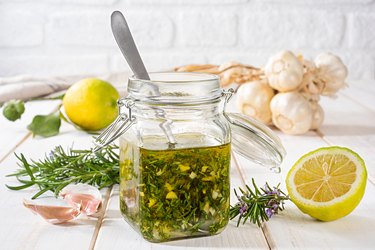
Each year, an estimated 48 million Americans get sick due to foodborne illnesses, according to the USDA. While many of us know that certain foods are more likely to be contaminated with bad bacteria and make us unwell (think: deli meats, seafood and eggs), other lesser-known foods, when stored or handled improperly, can result in illness, too.
Indeed, these potentially hazardous foods (PHF) can also support life and multiply microorganisms.
Video of the Day
Video of the Day
Here food safety expert Jeff Nelken discusses four surprising foods that can make you sick, plus tips on food safety storage to help prevent food poisoning.
1. Homemade Garlic in Oil
While a DIY garlic-in-oil mixture is mouthwatering, it can spur serious sickness if not handled or stored correctly.
As a root veggie, garlic is susceptible to spores of clostridium botulinum bacteria, which are commonly found in soil, Nelken says. Though harmless when oxygen is present, these spores thrive in conditions without oxygen, such as when garlic and oil is bottled, he explains.
As the spores sprout in this oxygen-free environment, they produce a nerve toxin that can result in botulism, an illness that affects the nervous system and can cause difficulty breathing, muscle paralysis and, in severe cases, death, according to Michigan State University.
Consequently, to reduce the risk of botulism, homemade garlic-in-oil mixtures should always be stored in the fridge and used within two to three days, or tossed out after two hours at room temperature, per Michigan State University.
2. Home-Canned Vegetables
Similar to garlic in oil, foods that are canned or fermented at home carry a higher risk of contamination from the botulism toxin. In fact, home-canned vegetables are the number one cause of botulism outbreaks in the United States, according to the Centers for Disease Control and Prevention (CDC).
And foods with a low acid content, including asparagus, green beans, beets, corn, potatoes, some tomatoes and figs, are the most frequent sources of home-canning-related botulism, per the CDC.
If you can your own foods, you can lower your chance of botulism by following the USDA Complete Guide to Home Canning. Once you label and date your jars, store them in a cool, dark place in temperatures between 50 and 70 degrees Fahrenheit, and always refrigerate after opening, according to the CDC.
3. Rice
Rice is one of the most common high-risk foods for food poisoning. That's because dry rice can contain bacillus aureus spores, Nelken says. With just a little moisture, these spores can reproduce and make you sick.
That's why you should always store uncooked rice in a cool, dry place. To be safe, transfer the rice into an airtight container once opened and keep it in the pantry (or even the freezer).
But the food safety concerns don't end with dry rice: Cooked rice provides a perfectly moist environment for potentially poisonous pathogens. And rice that's mixed with other high-risk foods like seafood, pork or egg has an even greater probability of contamination, according to the Australian Institute of Food Safety (AIFS).
Indeed, storing cooked rice improperly is a leading cause of foodborne illnesses in the world, per the AIFS.
To store cooked rice correctly, first remove it from the heat and cool it down quickly to prevent bacterial growth (the safe refrigerator storage temperature is 40 degrees Fahrenheit or below), per the USDA. Once cooled, seal your rice in an airtight container and refrigerate for three to four days.
When reheating leftover rice, heat until the grains reach a temperature of 165 degrees Fahrenheit to kill any harmful bacteria, per the USDA.
4. Fruit
Believe it or not, fresh fruits are considered PHF, Nelken says. For example, berries and melon have a high risk of contamination as bacteria like listeria and salmonella flourish in the warm, humid climates where the fruit is grown, according to the AIFS.
You can help prevent food poisoning by thoroughly washing (and patting dry) fruit and refrigerating them at temperatures below 41 degrees Fahrenheit to slow bacterial growth, Nelken says.